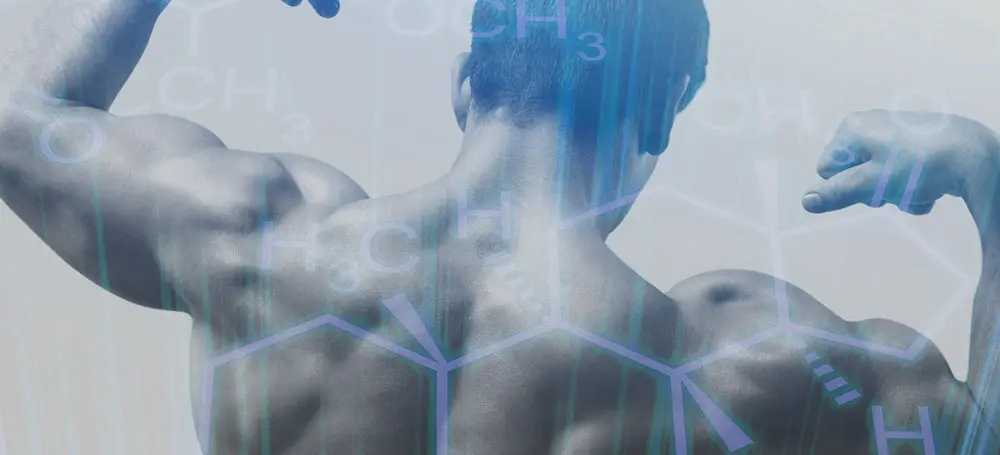When you hear the word “testosterone,” you may think first of its role in powering the male sex drive. You’re certainly aware of the part it plays in triggering physical changes at puberty. However, testosterone is also intimately involved in many areas of a man’s health, ranging from healthy bones to muscle mass, healthy weight, and even a man’s mood.
Take a look at how important testosterone is to male health in general and the role it plays in keeping men healthy.
What Is Testosterone?
Testosterone is a hormone that’s produced in the male testes. The brain monitors the production of testosterone, controlling it through the pituitary gland, which lets the testes know when to produce more testosterone.
Testosterone is responsible for the development of sexual characteristics during puberty, and it remains important throughout a man’s life. Most notably, it regulates the male sex drive as well as sperm production. In addition, it plays a role in maintenance of bone mass and density, muscle strength and mass, fat distribution, and other important health factors.
The Roles Testosterone Plays in Men’s Health
Testosterone plays several significant roles in male health, including fueling the sex drive and helping to regulate several important bodily functions. These include the following.
Testosterone Triggers Puberty
Male puberty occurs when testosterone amps up production between the ages of about 10 and 15. During this time, the penis and testicles grow. The boy starts to get taller, often very rapidly, and his bones and muscles become stronger. He starts to develop facial and pubic hair, as well as hair all over his body. In addition, his voice deepens and becomes what we think of as a man’s voice.
Testosterone is at work in less visible ways as well. Production of red blood cells amps up at puberty, and fat distribution starts to change. In addition, the testes start to produce sperm, and the male sex drive revs up.
Testosterone Fuels Men’s Sexual Health
If you had to point to one key role that testosterone plays, it would be its support for men’s sexual health and function. Testosterone is involved in every aspect of men’s sexual function, from the desire to have sex in the first place to the ability to achieve and maintain an erection to issues surrounding fertility.
It’s testosterone that triggers neural receptors that in turn start the chemical reactions that result in an erection. As that testosterone flows through your body via the blood, it returns to the brain, where it reinforces the libido. The higher your testosterone levels, the more likely you are to experience sexual arousal and good erectile function. Low testosterone can hinder this process, causing low sex drive and erectile dysfunction.
Testosterone Supports Cardiovascular Health
Testosterone boosts the production of red blood cells, which are needed to provide oxygen to the body’s organs and muscles. Without testosterone, men are subject to a variety of cardiovascular risks. Studies show that men with healthy testosterone levels are significantly less likely to experience a heart attack or stroke. While the jury is still out on how much testosterone replacement therapy may help fight heart disease, some studies indicate that hormone therapy helps widen arteries.
Testosterone Supports Bone Health
Testosterone is a significant contributing factor to bone mineral density, which is key to bone health and strength. As men age and start to lose testosterone, their bones can become fragile and brittle. Not only are they more susceptible to broken bones, but they are also more at risk for osteoporosis, a disease characterized by loss of bone density and mass. Testosterone replacement therapy results in a marked increase in bone density in the spine and hips.
Testosterone Protects Lean Muscle Mass
Boys start to develop muscle mass with the onset of puberty and the concomitant increase in testosterone — and testosterone maintains and increases muscle mass through life. Having a leaner, more muscular body has other positive health effects, including controlling weight gain and boosting energy, especially when combined with exercise. As testosterone decreases with age, men can see the opposite occur — they find themselves losing muscle mass and gaining fat in its place. Testosterone replacement therapy has been shown to decrease fat and increase muscle mass.
Testosterone Helps Prevent Weight Gain
Testosterone supports the process by which your body turns food into energy. It stimulates the metabolism to help stave off unwanted weight gain. In addition, healthy testosterone boosts energy levels, which may encourage you to stay active, which also helps to maintain a healthy weight. As testosterone levels drop, you’re more likely to gain weight, with all the health risks that entails.
Testosterone Improves Mood
Testosterone levels also have a distinct effect on mood and emotional well-being. It’s hard to unravel the direct effect of testosterone on mood from the overall effect of good physical health on mood. However, low testosterone has been associated with mental health problems, including depression, anger, fatigue, and irritability, though the reason for the low testosterone may be a contributing factor.
Testosterone Protects Cognitive Function
Testosterone is a factor in maintaining cognitive function with age, especially those involving verbal processing speed and memory. As testosterone declines, men’s coordination and visual-motor skills also decline. On the other hand, men with higher levels of testosterone show less evidence of Alzheimer’s disease and improved spatial memory.
Diseases and Conditions That Affect Testosterone Levels
The most common reason for decreases in testosterone level is aging. Men start to see drops of 1% per year in their total testosterone levels beginning in their 30s. In addition, a wide variety of conditions and diseases can affect testosterone levels, including the following:
- Chemotherapy or radiation used in treatment of cancer
- Cancer
- Medications, including tranquilizers, steroids, and variants of morphine
- Certain autoimmune conditions
- Injuries to the testes
- HIV and AIDS
- Infection of the testes
- Genetic diseases, including notably hemochromatosis, Klinefelter Syndrome, Prader-Willi Syndrome and others
- Kidney failure and dialysis
- Hypogonadism
- Use of drugs and alcohol
- Cirrhosis of the liver
- Disorders that affect hormone levels
- Type 2 diabetes
The Effects of Too Much Testosterone
While it’s rare for men to have levels of testosterone that are too high, when it occurs, it can have some very negative effect on those men’s health. These can include:
- Increased risk of heart attack and blood clots
- Liver disease
- Fluid retention and edema
- High blood pressure
- High cholesterol
- Headaches
- Aggressive behavior
- Early puberty (before the age of 9)
- Acne
- Low sperm counts
- Weight gain
- Shrinking of the testicles
- Enlargement of the prostate
The Effects of Too Little Testosterone
While overly high testosterone is very rare, low testosterone, on the other hand, is all too frequent a condition for men, especially as they age. It can hit at an earlier age — boys with too little testosterone may fail to grow facial or body hair, their voices may not change, and their genitals may not grow normally. But for the most part, the problem of low testosterone is one that hits men in their 30s and older.
Testosterone levels drop gradually, so men may not notice the symptoms right away. Unlike women, who experience a rapid drop in hormones when menopause hits, men see their hormone levels drop only 1% to 2% per year. By the age of 45, about one-third of men have experienced enough decrease in testosterone to be considered testosterone-deficient.
When men have a testosterone deficiency, they are likely to experience obvious sexual effects, including the inability to achieve or maintain an erection, as well as drop in their sex drive. In addition, low testosterone may result in:
- Loss of muscle strength and mass
- Depression, irritability, and other changes of mood
- Brittle bones and osteoporosis
- Reduced sperm count/infertility
- Loss of body and facial hair
- Decreased energy
- Insomnia and other sleep disturbances
- Low sperm count and infertility
- Fatigue
- Obesity/increased body fat
- Enlarged and/or tender breasts
- Shrinkage of the testes
Many of these health issues can and do exist apart from testosterone deficiency, of course. But if you’ve been experiencing any of these symptoms and haven’t been able to find a cause for them, it may be time to have your testosterone levels tested. This is especially true when any of these symptoms co-occur with sexually related symptoms such as lowered sex drive or difficulty maintaining an erection.
What You Can Do: Testosterone Replacement Therapy
Testosterone replacement therapy isn’t appropriate for every man who experiences some of the symptoms listed above. Physicians employ testosterone replacement therapy primarily to treat low testosterone production, regardless of the cause.
If you are experiencing symptoms of low testosterone, however, especially those involving problems with sexual function, you should definitely have your testosterone levels tested. Many men find that this simple blood tests provides the answers to the puzzling array of symptoms they’ve been dealing with.
Testosterone is necessary for male health, and when it’s lacking in any way, all sorts of health problems can ensue. That’s why testosterone replacement therapy has been a doorway to a healthy, fresh start on life for many men. By supplementing testosterone to compensate for a verified testosterone deficiency, some men even find that they’re not only getting rid of symptoms that have plagued them for some time, but also getting rid of symptoms they weren’t even consciously aware they were experiencing.
Testosterone replacement therapy is delivered through a variety of means, so every man who needs it can choose the best fit for his lifestyle and schedule. Once lab tests have confirmed a testosterone deficiency, you can choose between these very different means of delivery.
- Testosterone gels. These gels contain a measured amount of testosterone, which is absorbed through the skin. Typically, you rub the gel on your upper arm every four days or so. This method of testosterone replacement is ideal for men who want to administer treatment themselves at home and who are able to keep the gel away from anyone else.
- Testosterone patches. Also a good choice for men who want to administer testosterone in the privacy of their homes, these patches also release testosterone through the skin. They’re less messy than the gels, functioning in a way similar to the nicotine patches used by smokers trying to quit the habit. The patch does have to stay on the skin, where it’s visible, during use, with replacement required about every week.
- Testosterone injections. When you hear the word “injection,” you might think you’ll have to go to your doctor for this means of testosterone replacement. Actually, after training, you can also administer this form of testosterone at home. The shot goes into your gluteal muscles, and the effects can last up to a month, making it a good choice for men who don’t want to keep track of when it’s time for the next dose.
- Testosterone pellets. We’ve finally reached a means of testosterone replacement that can’t be done at home. Testosterone pellets are placed under the skin, where they dissolve and release measured doses of testosterone into the blood. Typically, the pellets are placed in the buttocks, where they’re not obvious. While they do require a visit to the doctor every three to six months, this is the ideal choice for the man who wants to set it and forget it.
Boston Vitality Cares About Your Whole Health
At Boston Vitality, we believe in treating the whole man. We’ll help make sense of the disparate symptoms you’ve been dealing with and do the testing needed to determine if testosterone replacement therapy is the right solution.
Contact us at 781-399-LowT (-5698) to see how we can help you get on a path toward health today.


